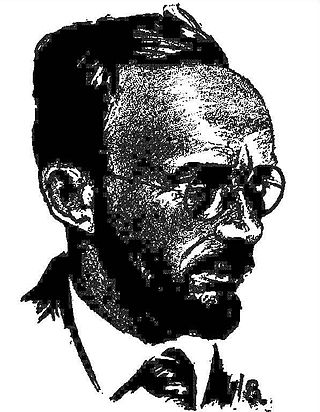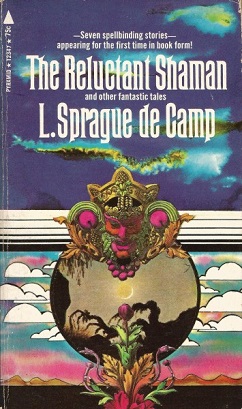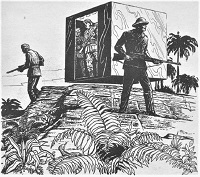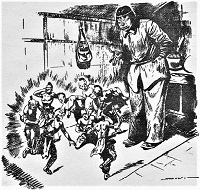Synopsis
For mild-mannered Ovid Ross of Rattlesnake, Montana, struggling to gain his footing among the city slickers of New York City, the Telegog Company seems to offer a solution to his social problems. Its proprietary technology allows the inept to have their bodies taken over remotely by experts who easily steer them through awkward situations. After hearing salesman Mr. Nye's sales pitch and meeting in-house professionals Gilbert Falck and Jerome Bundy, Ross signs up and receives the necessary implant.
Ross first signals his "guide" on facing a terrifying job interview with Timothy Hoolihan, tyrannical director of The Garment Gazette trade journal; Falck takes over and under his control Ross effortlessly finesses Hoolihan and gets the job. Enthusiastic over his success, Ross treats Falke to drinks after work, and later calls up his girlfriend Claire La Motte with the good news. To celebrate, Claire invites him over for a Sunday picnic at the estate of the Peshkovs, a wealthy Russian family she works for, including Falck and the latter's girl in the invitation.
After Ross learns the ropes at his new job he is sent out to interview one of the journal's major advertisers, Marcus Ballin of Outstanding Knitwear, for a feature article. Worried he might blow it, he calls in Falck again. He also extends Claire's invitation and arranges to have Bundy backstop him on the picnic if necessary, given that Falck will be unable to do so.
Under Falck's guidance, Ross's interview of Ballin goes well until the knitwear man starts talking about a current project; a pageant to choose the most beautiful bust in America from among women modeling Outstanding's sheer sweaters. It seems he needs a third judge. To his horror, Ross finds Falck volunteering him for the role. His guide afterwards says he has done Ross a favor, it being "an opportunity most men would fight tooth and nail for." The mortified Ross demands Falck see him through it, to which Falck smugly replies he has every intention of doing so.
Strait-laced Hoolihan is not happy to hear what Ross will be doing, but his subordinates talk him into agreeing, lest the journal lose Ballin's account. Meanwhile, Sunday rolls around, and Ross picks up Falck and the guide's date Dorothea Dunkelberg for their picnic with Claire. Having signaled Bundy, Ross is confident he will not commit any gaffes. Claire shows the party around the Peshkov estate and points out neighboring properties, among them the Heliac Health Club, a nudist camp.
After lunch, Falck asks to use the phone, and uses it to call Bundy. He tells Bundy that Ross is bombing with Claire, and suggests he "give him a more aggressive and uninhibited pattern." Bundy agrees, unaware that Falck, who has become smitten with Claire, is not out to help Ross but to sabotage him. Shortly Ross is bossing the party, even browbeating everyone into swimming naked. At this point the Peshkovs, who were expected to be absent all day, return, forcing the dishabille picnickers to run for the woods to hide. In a bit of luck, they find themselves on the grounds of the Heliac Club, where they fit right in. Less happily, one of the club members turns out to be Marcus Ballin, but neither he nor Ross are interested in their presence at Heliac coming out, and agree to keep things quiet. Ballin does suggest Claire enter his contest, though!
Provided clothing by a helpful matron, Claire retrieves the others' outfits from the Peshkov estate, and Ross uses the signaler in his pocket to have Bundy release control. He then shamefacedly apologizes to Claire for his earlier behavior, but she laughs it off, confiding she has not had so much fun in years. She also decides to enter Ballin's contest. Despite his chagrin over Bundy's guidance, Ross realizes he has to stick with Telegog for a while. As for the frustrated Falck, thwarted in his sabotage attempt, he doubles down, installing a switch in Bundy's control booth that will enable him to secretly flip control of their clients whenever he wants.
At the contest, there are complications. Ross, guided by Falck, performs well, but Claire is worried because her employer Bogdin Peshkov, whom she suspects of lusting after her, is present—and drunk. Sure enough, when Claire is denied first place, Peshkov makes a scene, whereupon Ballin orders him removed. Falck, seizing his chance to embarrass Ross, flips his switch, and his control of Ross is flipped to Bundy, currently controlling a ballet dancer; Ross pirouettes across the stage, slamming into Peshkov, who is now threatening the gathering with a pistol. As the shocked Bundy releases control, Ross himself takes charge and successfully restores order.
Far from being shamed, Ross is now a hero. The grateful Ballin hires him away from The Garment Gazette, and Mr. Nye at Telegog assures him that Falck's subterfuge has been discovered and the disgraced guide fired. He offers a free extension of its services in compensation for the trouble, but Ross declines. Newly confident in his own abilities, he has proposed to Claire and been accepted. But, Nye urges, suppose he prove bashful on his wedding night—? "No!" shouts Ross. "By gosh, there's some things I'm gonna do for myself!"
Reception
P. Schuyler Miller, reviewing it with the other stories in A Gun for Dinosaur and Other Imaginative Tales wrote "Lack confidence? Don't--as 'The Guided Man' did--let the operators of the Telagog Company take over for you." He considered it "distinctly late-model de Camp, commenting on the current scene--and especially the suburban, or more properly exurban scene--by projecting it into the future, where its 'things of custom' appear in all their incongruity. As the plot grows simpler and simpler, the settings and commentary carry more and more of the load, in the manner of an off-Broadway play. And there will be those who say the author has written himself into most of his rather put-upon heroes-in-spite-of-themselves." [3]
Avram Davidson, on the other hand, found the collection "a great disappointment ... Time after time he gets hold of a great idea--and throws it away in playing for laughs of the feeblest conceivable sort." He singled out one exception, but it wasn't this one. [4]
Robert Coulson, reviewing The Best of L. Sprague de Camp, wrote "'The Guided Man' is unsophisticated and unsure of himself in the big city, so he hires a firm of experts to guide him in crucial situations by actually taking over his body, with, of course, unexpected results, especially since one of the operators has designs on his client's girl friend. This is the sort of 'society fantasy' that the slick magazines of the era were buying, though this particular story was probably too scientific and too rowdy for them." [5]

Lyon Sprague de Camp was an American author of science fiction, fantasy and non-fiction literature. In a career spanning 60 years, he wrote over 100 books, both novels and works of non-fiction, including biographies of other fantasy authors. He was a major figure in science fiction in the 1930s and 1940s.

Murray Fletcher Pratt was an American writer of history, science fiction, and fantasy. He is best known for his works on naval history and the American Civil War and for fiction written with L. Sprague de Camp.

Brian Dannelly is a German born American film director and screenwriter best known for his work on the 2004 film Saved!

Man and Power: the Story of Power from the Pyramids to the Atomic Age is a science book for children by L. Sprague de Camp, illustrated with documents, photographs by Russ Kinne, Roman Vishniac, and others, and paintings by Alton S. Tobey, first published in hardcover by Golden Press in 1961.
"Perpetual Motion" is a science fiction short story by American writer L. Sprague de Camp, part of his Viagens Interplanetarias series. It was first published under the title "Wide-Open Planet" in the magazine Future Combined with Science Fiction Stories in the issue for September–October, 1950. It first appeared in book form under the present title in the collection The Continent Makers and Other Tales of the Viagens, published in hardcover by Twayne Publishers in 1953, and in paperback by Signet Books in 1971. It was also included in the paperback edition of The Queen of Zamba published by Dale Books in 1977. This edition was reprinted by Ace Books in 1982 as part of the standard edition of the Krishna novels. A trade paperback edition in which the story was paired with Richard Wilson's "And Then The Town Took Off" was issued by Armchair Fiction in May, 2013 as Wide-Open Planet & And Then The Town Took Off. The story has been translated into Portuguese, Dutch, and Italian.

The Hostage of Zir is a science fiction novel by American writer L. Sprague de Camp, the seventh book of his Viagens Interplanetarias series and the fifth of its subseries of stories set on the fictional planet Krishna. Chronologically it is the third Krishna novel. It was first published in hardcover by Berkley/Putnam in 1977, and in paperback by Berkley Books in 1978. A new paperback edition was published by Ace Books in 1982 as part of the standard edition of the Krishna novels. An e-book edition was published by Gollancz's SF Gateway imprint on September 29, 2011 as part of a general release of de Camp's works in electronic form. The novel has also been translated into German and Czech.

The Best of L. Sprague de Camp is a collection of writings by American science fiction and fantasy author L. Sprague de Camp, first published in hardback by Nelson Doubleday in February 1978 and in paperback by Ballantine Books in May of the same year as a volume in its Classic Library of Science Fiction. The book was reprinted by Ballantine in May 1986. It was reissued in trade paperback and ebook editions by Phoenix Pick in December 2014. It has also been translated into German.

The Reluctant Shaman and Other Fantastic Tales is a collection of short stories by American science fiction and fantasy author L. Sprague de Camp, first published in paperback by Pyramid Books in November 1970. An E-book edition was published by Gollancz's SF Gateway imprint on September 29, 2011 as part of a general release of de Camp's works in electronic form. The pieces were originally published between 1939 and 1958 in the magazines Thrilling Wonder Stories, Unknown, and Fantastic Universe. The collection has also been translated into French and German.

The Glory That Was is a science fiction novel by American writer L. Sprague de Camp. It was first published in the science fiction magazine Startling Stories for April, 1952, and subsequently published in book form in hardcover by Avalon Books in 1960 and in paperback by Paperback Library in March 1971. It has since been reprinted in paperback by Ace Books in July 1979 and Baen Books in April 1992, and in trade paperback by Phoenix Pick in September 2014. An E-book edition was published by Gollancz's SF Gateway imprint on September 29, 2011 as part of a general release of de Camp's works in electronic form; a second e-book edition was issued by Phoenix Pick in September 2014. The book has also been translated into Italian, German and Greek.

"A Gun for Dinosaur" is a classic time travel science fiction story by American writer L. Sprague de Camp as part of his Rivers of Time series. It tells the story of four men who travel into the past to hunt dinosaurs.

"The Animal-Cracker Plot" is a science fiction short story by American writer L. Sprague de Camp, a story in his Viagens Interplanetarias series. It is the second (chronologically) set on the planet Vishnu, and the first to feature the interstellar con-man Darius Koshay. It was first published in the magazine Astounding Science-Fiction in the issue for July, 1949. It first appeared in book form in the collection The Continent Makers and Other Tales of the Viagens, published in hardcover by Twayne Publishers in 1953, and in paperback by Signet Books in 1971. The story has been translated into Portuguese, Dutch, and Italian.

"Git Along!" is a science fiction short story by American writer L. Sprague de Camp, part of his Viagens Interplanetarias series. It is the second (chronologically) set on the planet Osiris, as well as the second to feature the interstellar con-man Darius Koshay. It was first published in the magazine Astounding in the issue for August, 1950. It first appeared in book form in the anthology The Outer Reaches, edited by August Derleth, published in hardcover by Pellegrini and Cudahy in 1951, and was gathered together with other Viagens stories in the collection The Continent Makers and Other Tales of the Viagens, published in hardcover by Twayne Publishers in 1953, and in paperback by Signet Books in 1971. The story has been translated into Portuguese, Dutch, Italian and German.

"The Colorful Character" is a science fiction short story by American writer L. Sprague de Camp, part of his Viagens Interplanetarias series. It was first published in the magazine Thrilling Wonder Stories in the issue for December, 1949. It first appeared in book form in the collection Sprague de Camp's New Anthology of Science Fiction, published simultaneously in hardcover by Hamilton and in paperback by Panther Books in 1953.

"The Gem in the Tower" is a short story by American writers L. Sprague de Camp and Lin Carter, featuring the fictional sword and sorcery hero Conan the Barbarian created by Robert E. Howard. It is a rewritten version of "Black Moonlight", an earlier story by Carter alone featuring his own sword and sorcery character Thongor. The Conan version was first published by Bantam Books in the paperback collection Conan the Swordsman in August 1978, and was reprinted in the anthology The Year's Best Fantasy Stories: 5 and later editions of Conan the Swordsman. The collection was later gathered together with Conan the Liberator and Conan and the Spider God into the omnibus collection Sagas of Conan. The story has also been translated into Italian and French.

The Incomplete Enchanter is a collection of two fantasy novellas by American writers L. Sprague de Camp and Fletcher Pratt, the first volume in their Harold Shea series. The pieces were originally published in the magazine Unknown in the issues for May and August 1940. The collection was first published in hardcover by Henry Holt and Company in 1941 and in paperback by Pyramid Books in 1960.

"The Gnarly Man" is a science fiction story by American writer L. Sprague de Camp, about an apparently immortal Neanderthal Man surviving into the present day.

"Divide and Rule" is a science fiction novella by American writer L. Sprague de Camp. It was first published as a serial in the magazine Unknown from April to May, 1939 and first appeared in book form in de Camp's collection Divide and Rule. The story was revised for book publication. The first stand-alone book edition of the story was published as a large-print hardcover by Thorndike Press in September 2003. An E-book edition of the story was issued by Gollancz's SF Gateway imprint on September 29, 2011 as part of a general release of de Camp's works in electronic form.

"The Merman" is a science fiction story by American writer L. Sprague de Camp, based on the concept of human biological engineering. It was first published in the magazine Astounding Science-Fiction for December, 1938. It first appeared in book form in the collection The Wheels of If and Other Science Fiction ; it later appeared in the anthology Science Fiction of the Thirties and the collection The Best of L. Sprague de Camp. The story has been translated into German

"The Reluctant Shaman" is a contemporary fantasy story by American writer L. Sprague de Camp. It was first published in the magazine Thrilling Wonder Stories for April 1947. It first appeared in book form in the collection The Reluctant Shaman and Other Fantastic Tales ; it later appeared in the magazine Science Fiction Yearbook no. 5 and the collection The Best of L. Sprague de Camp. The story has been translated into French and German.

"The Hibited Man" is a classic science fiction short story by L. Sprague de Camp. It was first published in the magazine Thrilling Wonder Stories for October, 1949. It first appeared in book form in the hardcover anthology My Best Science Fiction Story. It has also appeared in the paperback anthology The Shape of Things.



















